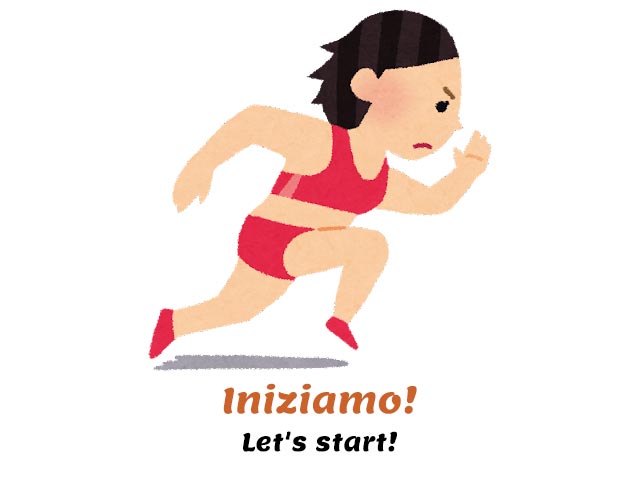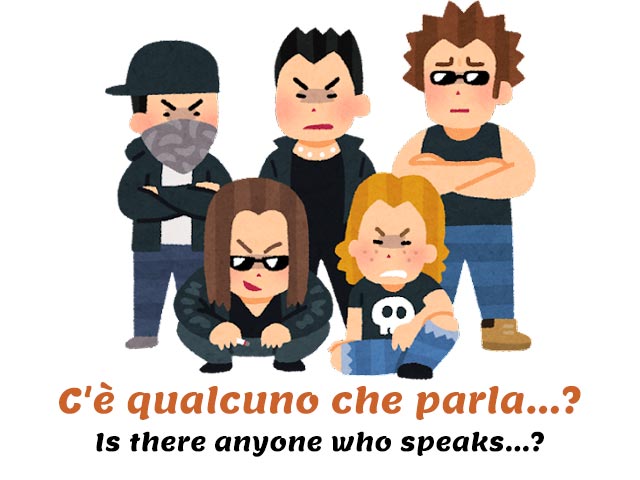How exactly do you say do you speak Italian in Italian?
As you will see in this lesson, there’s actually more than one way of asking whether someone speaks Italian or not, depending on the situation.
Don’t worry, non ti preoccupare, I’m here to help you!
By the end of this lesson, you’ll know everything you need to know to ask do you speak Italian in Italian like a real pro. Let’s get started! Iniziamo!

How to formally ask do you speak Italian in Italian
More often than not, you will be in conversation with complete strangers and people with whom you are not very familiar.
In such cases, you must choose carefully how to ask in Italian if they speak Italian. Italians are very friendly people and can certainly chiudere un occhio, turn a blind eye to language bloopers (in fact, we love it when foreigners take the time to learn our language!), but formality, when formality is needed, is always appreciated.
Plus, it makes a very good impression!
So, how do you formally ask do you speak Italian in Italian?
Lei parla italiano? / Parla italiano?
Do you speak Italian? (formal)

Let’s analyze this sentence word by word.
Lei usually means she, third person singular subject pronoun, but it also functions as the polite form for you in Italian especially when it’s written with a capital l, Lei.
Parla is the third-person singular present tense conjugation (that’s a mouthful!) of the verb parlare, to speak. It might be useful to have a look at the entire present tense conjugation, so here it is, complete with pronunciation:
Present tense conjugation for parlare
| io | parlo |
| tu | parli |
| lui, lei | parla |
| noi | parliamo |
| voi | parlate |
| loro | parlano |
From this table, you can see that the correct conjugation for the pronoun lei is parla.

Italian is translated as italiano. If you need to write it down in a message, make sure you don’t capitalize the first letter.
Languages and nationalities are not capitalized in Italian.
Subject pronouns can be omitted in Italian, so you can use the short version Parla italiano?. Since the conjugation forms are different for each pronoun, unlike in English, there’s no doubt that you’re addressing the person with a certain amount of respect.
You’ll also notice that you don’t need an auxiliary verb to form questions in Italian. Cute, isn’t it? Affirmative and interrogative forms differ only by a sign! 😉
Title: Italian All-in-One For Dummies
Language: English / Italian
Publisher: For Dummies
Pages: 672
Learn to speak Italian like a native? Easy.
Italian All-in-One For Dummies appeals to those readers looking for a comprehensive, all-encompassing guide to mastering the Italian language. It contains content from all For Dummies Italian language instruction titles, including Italian For Dummies, Intermediate Italian For Dummies, Italian Verbs For Dummies, Italian Phrases For Dummies, Italian Grammar For Dummies, and Italian For Dummies Audio Set.
How to informally ask do you speak Italian in Italian
Italians don’t address children with the formal lei, even if they don’t know them.
If you ever happen to be chatting with a kid and want to speak Italian to them, you can ask…
Tu parli italiano? / Parli italiano?
Do you speak Italian? (informal)
Look at the table in the other paragraph. What’s the parlare conjugation for tu, the informal form for you in Italian? That’s right, parli.

Other ways to ask do you speak Italian in Italian
Let’s say you’re in a crowded room and you can’t go around asking everyone if they speak Italian. What should you do? There’s a specific formula that you can use in both informal and formal settings.
C’è qualcuno che parla italiano?
Is there anyone who speaks Italian?
We’ve already covered some of the elements in this sentence, so let me focus on the words we haven’t seen yet.
C’è is the shortened form of ci è, but you will only ever find it as c’è. Ci è is NEVER used, not even in the written language. Qualcuno translates both someone and anyone.
That said, this is the best question to ask if you’ are among’re in a group of people and want to know if anyone speaks Italian.
If you want to sound a little more polite, you can say:
C’è qualcuno che parla italiano, per favore?
Is there anyone who speaks Italian, please?
With per favore meaning please. Literally for favor.

How do you say do you speak Italian in Italian to groups of people
There’s another way to ask do you speak Italian in Italian, and that’s the plural form of the question.
Again, let me show you the present tense conjugation for parlare.
| io | parlo |
| tu | parli |
| lui, lei | parla |
| noi | parliamo |
| voi | parlate |
| loro | parlano |
The plural you in Italian is voi. So let’s say there’s a group of students and you want to ask them do you speak Italian in Italian. You can either use the formula we’ve just seen, is there anyone…? OR you can ask…
Parlate italiano?
Do you speak Italian? (plural)
Do you speak… language?
If you want to ask a person if they speak a certain language, you can use the Parla…? formula we saw earlier on how to ask do you speak Italian in Italian and add a random nationality from this list:
- inglese (English)
- spagnolo (Spanish)
- tedesco (German)
- francese (French)
- cinese (Chinese)
- russo (Russian)
- arabo (Arabic)
Parla arabo?
Do you speak Arabic? (formal)
Parlare arabo and parlare turco (speak Turkish) are popular Italian expressions that mean to be impossible to understand.
If someone tells you that you parli arabo, it means that they don’t understand a single word you’re saying!
Parlate tedesco?
Do you speak German? (plural)
Parli cinese?
Do you speak Chinese? (informal)
That’s the end of our lesson, now you know everything you need to ask do you speak Italian in Italian. Don’t be shy and ask away: we love to have a good chit-chat with foreigners, and if we really can’t find a common “spoken means of communication”, we can always speak with gestures! 😉
What next?
Now that you’ve seen how to say do you speak Italian in Italian, you might want to keep learning Italian online with these free Italian resources:
❤️ If you liked this lesson on how to say do you speak Italian in Italian, consider sharing it with your social media friends who are also studying Italian.





Parli cinese? doesn’t that mean do you speak chinese? in italian not german? in the example next to the sentence after; it says it’s german, but it’s pretty obvious this isn’t the italian word for german. i only ask because i am new to learning and wouldn’t want to make a huge mistake…
Hi there, you’re right, the correct translation is actually Do you speak Chinese?. Nice catch, thank you!